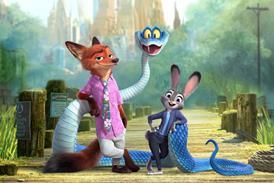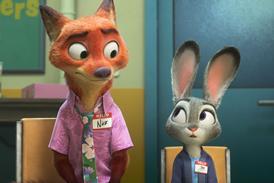THE PANEL
Ricardo Tozzi, producer, Cattleya and president of Anica, Italy
Lionello Cerri, producer, Lumiere and Co, Italy
Herve Truffaut, producer, Films Christian Fechner, France
Jose Covo, managing director, Twentieth Century Fox France
Sytze Van Der Laan, Studio Hamburg Produktion, Germany
Jens Meurer, producer, Egoli Tossell Film, Germany
Victor Ugalde, director, producer, and head of Fidecine, Mexico
Siddharth Roy Kapur, director, UTV Motion Pictures, India
Yin Xu, CEO, Hengdian World Studios, China
Enrique Costa, head of acquisitions, Avalon Productions, Spain
Joaquin Padro, producer, Rodar Y Rodar, Spain
Juan Gordon, producer, Morena Films, Spain
Are we heading for a homogenised global film industry'
Jose Covo: On the contrary, there is more and more room for diversity. At the same time, there are fewer borders than before and I think that's a good thing.
Sytze Van Der Laan: No, that's not the majors' intention because it doesn't work. People want to see local product so the studios will ensure they tap into local talent and generate local stories.
Jens Meurer: Films and talent go to where the story - and the money - is.
Victor Ugalde: Yes. It's more and more homogenised. And it has to be limited by law.
Siddharth Roy Kapur: I hope not, when it comes to creative output at least. When it comes to sources of funding and exploitation of revenue streams, yes, the growth in new-media platforms, digitalisation and greater collaboration between studios across countries will lead to wider distribution of content - but not a homogenised industry.
Yin Xu: I don't think it will be a problem even if we are. I think for China - at least Hengdian - the main point is that the Hollywood presence has brought progress. Even if we've adopted the Hollywood model, China's film industry still has its own uniqueness.
Enrique Costa: It is not going to happen. If you are in the US you have a film like Juno, an independent feature, and at the same time you have The Orphanage, also an independent feature. They are completely different films.
Joaquin Padro: Possibly. That's why US studios are looking for new talent in Europe and Asia because they want to handle different films that will connect with a worldwide audience from a different viewpoint.
Is there a clash between the Hollywood model of screen-writing - lots of writers, multiple rewrites, making it punchier - and the international preference for one writer whose vision is everything'
Lionello Cerri: There were not a lot of rewrites (on Days And Clouds), the suggestions were correct and interesting, and were taken on by the director and the writers. We shared a lot of ideas.
Herve Truffaut: The difference is enormous. And you can appreciate both the French and the American systems. The US system enables the screenwriter and director to improve on what is written by bringing in other writers. In France, we are bound by a law that can sometimes hinder that. The director in France is also considered the author, and the influence of the producer in France is not the same as in the US where the producer has more weight.
Sytze Van Der Laan: I don't think so - the studios are more auteur-driven for the projects they back in Europe. Back in the US, filling the pipeline is more important.
Jens Meurer: I believe that, whether it is the work of just one writer or not, Europe must constantly defend a vision of itself and its people in films. Ultimately, that's what I care about and that's the originality the studios draw from in a major way. The Hollywood model of film-making is mainly one of distribution - one that we can learn from or join forces with.
Victor Ugalde: I think so. And this clash between the models is also a battle over taking control of the content. Hollywood tries to control the content of the films, of the Latin America imaginary world, and that directly attacks the diversity of cinema.
Siddharth Roy Kapur: There is something to be learnt from the Hollywood studio philosophy of getting the script right before greenlighting a project. Studios and independent producers would do well to spend much more time on the script, in order to avoid heartburn later in the process. Hollywood-style film-making might not be a bad thing if it leads to greater professionalism and rigour in the process, while focusing on ensuring the best creative output.
Joaquin Padro: There is definitely a clash. But when you work with the likes of Fox Searchlight or Paramount Vantage or Warner Independent, they have a different mentality to the parent studios. Their approach is more similar to the local European producers - they respect the talent here in Spain.
Juan Gordon: No, not necessarily. And it is not a bad thing that there is a bit more pressure on the Spanish producers to deliver more commercial films. Here we tend to use one writer, and the fact the studio is involved in the production doesn't change that in any way.
Will maverick film-makers still manage to break through'
Ricardo Tozzi: We have a lot of new film-makers and there is space for more. Our directors have to force themselves to be more inventive, creative and courageous.
Jose Covo: Mindsets are beginning to mature - even in terms of politics - and France can't remain isolated in Europe. If we talk about the CNC, or others, the rules of the game are clear: no-one is here to hurt local interests and money does not have a nationality, whether it comes from Japan or Saudi Arabia. Culture is critical to the identity of a country and France has a film tradition that supports this.
Sytze Van Der Laan: With the funding system we have in countries such as Germany or France, anyone who has a great idea and a small budget will have a chance.
Jens Meurer: The wealth and diversity of European film-making (or European-inspired film-making) is the world's largest talent pool.
Juan Gordon: It is harder for mavericks because they are not making the films audiences want to see. Local film-makers should make better, more commercial films if we want them to shine at the box office.
- Interviews by Chiara Arroya, Martin Blaney, Chris Evans, Sheri Jennings, Liz Shackleton, Nancy Tartaglione-Vialatte and Sen-lun Yu.


















No comments yet